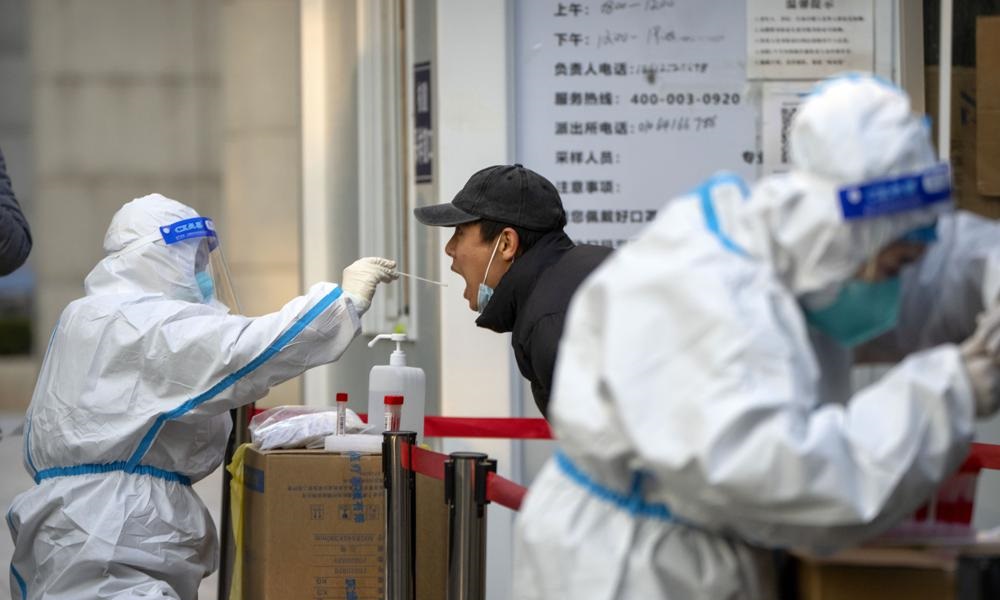COVID-19
Chinese city plans 250,000 quarantine beds to fight virus

China’s southern metropolis of Guangzhou announced plans Thursday to build quarantine facilities for nearly 250,000 people to fight surging coronavirus outbreaks even as the national government tries to reduce the impact of anti-disease controls that have confined millions of people to their homes, AP reported.
Guangzhou, a city of 13 million people and the biggest of a series of hot spots across China with outbreaks since early October, reported 9,680 new cases in the past 24 hours. That was about 40% of the 23,276 cases reported nationwide.
China’s infection numbers are low compared with the United States and other major countries, but the ruling Communist Party is trying to isolate every case. Repeated closures of neighborhoods, schools and businesses are fueling public frustration and clashes with health workers.
“The epidemic situation in Guangzhou still is very serious,” said a city official, Wang Baosen, according to the South Metropolis Daily newspaper.
Authorities in Guangzhou sent 95,300 people from the city’s Haizhu district to quarantine centers or for hospital treatment, the government announced.
Access to the district of 1.8 million people was suspended last week following outbreaks, but some controls were lifted Monday. Videos on social media that said they were shot in Guangzhou showed angry residents knocking over barriers set up by white-garbed health workers.
Guangzhou will add 246,407 beds, including 132,015 in hospital isolation wards and 114,392 for people who are infected but have no symptoms, the city government said. A series of rapid construction initiatives in China since the 2020 start of the pandemic have built hospitals with thousands of beds in as little as a week.
A spike in infections has led officials in areas across China to confine families to cramped apartments or order people into quarantine if a single case is found in their workplace or neighborhood.
Guangzhou is one of a number of populous cities that have been trying to respond to outbreaks with more flexible tactics.
The Communist Party promised last week to cut the cost of anti-virus controls by reducing the length of quarantines and changing other rules. However, party leaders said they will stick to the “zero COVID” strategy at a time when other countries are easing restrictions and trying to live with the virus.
Economists and health experts have said “zero COVID” might stay in place for up to another year because the government needs to vaccinate millions of elderly people before it can lift curbs that keep most foreign visitors out of China.
At a news conference, a health official said the government is trying to deal with “simple and crude” over-enforcement in response to public complaints.
The government has received 130,000 complaints including of local officials improperly isolating visitors arriving from low-risk areas, according to the official, Shen Hongbing, the deputy director of the National Bureau of Disease Control.
“We have sorted out the problems reported by the masses,” Shen said. He didn’t mention the girl’s death in Zhengzhou.
A total of 1,659 cases were reported in Henan province, another hot spot where Zhengzhou is located.
COVID-19
WHO declares end to COVID global health emergency

The World Health Organization said Friday that COVID-19 no longer qualifies as a global emergency, marking a symbolic end to the devastating coronavirus pandemic that triggered once-unthinkable lockdowns, upended economies and killed millions of people worldwide.
The announcement, made more than three years after WHO declared the coronavirus an international crisis, offers some relief, if not an ending, to a pandemic that stirred fear and suspicion, hand-wringing and finger-pointing across the globe, AP reported.
The U.N. health agency’s officials said that even though the emergency phase was over, the pandemic hasn’t finished, noting recent spikes in cases in Southeast Asia and the Middle East.
WHO says thousands of people are still dying from the virus every week, and millions of others are suffering from debilitating, long-term effects.
“It’s with great hope that I declare COVID-19 over as a global health emergency,” WHO Director-General Tedros Adhanom Ghebreyesus said.
“That does not mean COVID-19 is over as a global health threat,” he said, warning that new variants could yet emerge. Tedros noted that while the official COVID-19 death toll was 7 million, the real figure was estimated to be at least 20 million.
Tedros said the pandemic had been on a downward trend for more than a year, acknowledging that most countries have already returned to life before COVID-19.
He bemoaned the damage that COVID-19 had done to the global community, saying the pandemic had shattered businesses, exacerbated political divisions, led to the spread of misinformation and plunged millions into poverty.
When the U.N. health agency first declared the coronavirus to be an international crisis on Jan. 30, 2020, it hadn’t yet been named COVID-19 and there were no major outbreaks beyond China.
More than three years later, the virus has caused an estimated 764 million cases globally and about 5 billion people have received at least one dose of vaccine.
In the U.S., the public health emergency declaration made regarding COVID-19 is set to expire on May 11, when wide-ranging measures to support the pandemic response, including vaccine mandates, will end. Many other countries, including Germany, France and Britain, dropped most of their provisions against the pandemic last year.
When Tedros declared COVID-19 to be an emergency in 2020, he said his greatest fear was the virus’ potential to spread in countries with weak health systems.
Most recently, WHO has struggled to investigate the origins of the coronavirus, a challenging scientific endeavor that has also become politically fraught.
COVID-19
COVID-19 in Iran: Nearly 900 new cases, 24 deaths recorded

The Iranian health ministry announced on Sunday that more than 890 new cases of COVID-19 have been identified across the country during the past 24 hours, adding that 24 patients have died in the same period of time, Fars News Agency reported.
“A sum of 891 new patients infected with COVID-19 have been identified in the country based on confirmed diagnosis criteria during the past 24 hours,” the Iranian Health Ministry’s Public Relations Center said on Sunday, adding, “454 patients have been hospitalized during the same time span.”
The ministry’s public relations center said 611 people infected with COVID-19 are in critical condition.
COVID-19
China says 200 million treated, pandemic ‘decisively’ beaten

China says more than 200 million of its citizens have been diagnosed and treated for COVID-19 since it lifted strict containment measures beginning in November.
With 800,000 of the most critically ill patients having recovered, China has “decisively beaten” the pandemic, according to notes from a meeting of the ruling Communist Party’s all-powerful Politburo Standing Committee presided over by President and party leader Xi Jinping, AP reported.
China enforced some of the world’s most draconian lockdowns, quarantines and travel restrictions and still faces questions about the origins of the virus that was first detected in the central Chinese city of Wuhan in late 2019. Heavy-handed enforcement prompted rare anti-government protests and took a heavy toll on the world’s second-largest economy.
The official Xinhua News Agency quoted Xi as saying that policies to control the outbreak had been “entirely correct.” The abrupt lifting in November and December of the “zero COVID” policy that had sought to eliminate all cases of the virus led to a surge in infections that temporarily overwhelmed hospitals.
Case numbers have since peaked and life has largely returned to normal, although international travel in and out of China has yet to return to pre-pandemic levels.
China is now transitioning to a post-pandemic stage after a fight against the outbreak that was “extraordinary in the extreme,” Xinhua said.
The government will continue to “optimize and adjust prevention and control policies and measures according to the times and situations with a strong historical responsibility and strong strategic determination,” Xinhua said.
-

 Sport4 days ago
Sport4 days agoAfghanistan qualify for U19 Cricket World Cup 2026
-

 Regional5 days ago
Regional5 days agoDeadliest US strike in Yemen kills 74 at oil terminal, Houthis say
-

 World4 days ago
World4 days agoThousands of protesters rally against Trump across US
-

 World4 days ago
World4 days agoIran, US end nuclear talks in Rome, agree to meet next week
-

 Latest News3 days ago
Latest News3 days agoPolio vaccination campaign launched in Afghanistan
-

 International Sports3 days ago
International Sports3 days agoIPL 2025: 14-year-old Vaibhav Suryavanshi becomes youngest IPL player
-

 Latest News2 days ago
Latest News2 days agoChina invites various Afghan delegations to attend Shanghai forums
-

 International Sports1 day ago
International Sports1 day agoIPL 2025: Robo-Dog ‘Champak’ explained






















